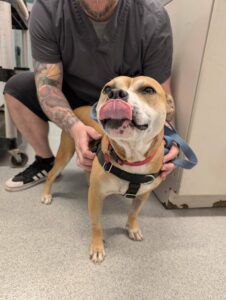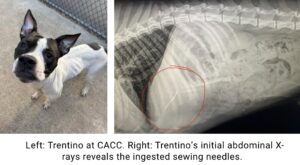GIVE NOW AND DOUBLE YOUR IMPACT
June 13, 2025
It’s been another incredibly tough week for the dogs we rescued from Chicago Animal Care and Control (CACC), the city’s chronically overcrowded shelter with a heartbreaking wave of emergency medical cases.
In addition to the dogs that continue to be treated, including Priscilla and Q-tip, we had seven more dogs and two kittens break with serious respiratory illness last week, as well as a kitten arrive with a compound leg fracture.
This wave of emergency medical cases has stretched our resources beyond anything we could have anticipated. In just two weeks, our critical vet bills have now soared to over $45,000. Over the past week, we raised $25,000 of our $50,000 goal. We are so appreciative for the matching grant from Heartland champion and board member Suzanne Shapiro.
We are excited to announce that an anonymous Heartland supporter stepped up with an incredible $10,000 matching donation! This amazing generosity means that every dollar you donate today will be doubled, thanks to their commitment to our mission and the dogs who desperately need us.
On behalf of everyone at Heartland, and especially the resilient dogs whose lives you help save, thank you for standing with us during this challenging time. Your unwavering support makes all the difference.
With gratitude,
The Heartland Team
 Priscilla also took a turn for the worse and had to be hospitalized for four more nights for severe broncho-pneumonia, with intensive care including oxygen and IV antibiotics. She was discharged earlier this week, but will need at least 14 more days of treatment and monitoring from our medical team.
Priscilla also took a turn for the worse and had to be hospitalized for four more nights for severe broncho-pneumonia, with intensive care including oxygen and IV antibiotics. She was discharged earlier this week, but will need at least 14 more days of treatment and monitoring from our medical team.

Emily
June 8, 2025
We are so sorry to have to share that Emily’s condition rapidly declined last night, and we had to make the incredibly painful decision to humanely euthanize her.

Emily’s foster contacted us when she became lethargic and couldn’t stand. They rushed her to the emergency room, where her red blood cell count was critically low, at just 12%. This was even lower than the previous week when she spent four nights in the ICU and received multiple blood transfusions for a parasitic tick-borne disease called Babesia.
Despite our hopes, Emily’s body wasn’t responding to the medication for her illness. At this point, transfusions and hospitalization were only buying her time, but it wasn’t going to be enough time to make a full recovery. After consulting with her veterinary team, we concluded that she was suffering, and the most compassionate choice was to let her go peacefully. Her foster, Pete, was by her side, ensuring she was with someone she knew and loved during her final moments.
We are heartbroken by this loss. Emily was a truly special dog – one of the sweetest, kindest, most resilient dogs we had ever met – and she was incredibly lucky to have her dedicated fosters, Laurie and Pete, who gave her so much love
and care.
Thank you all for your unwavering support, whether through medical assistance, social media advocacy, or financial assistance. Please keep Emily and her fosters in your thoughts during this difficult time. And as a reminder, please ensure your own dogs are current on their flea and tick preventatives.
In the meantime, we still have a number of other animals fighting for their lives. You can read more about them here and we remain grateful for any kind of support as we work through this rough patch.

Please, give now. Their lives depend on it
We’re reaching out today with an urgent need. Wednesday night, Priscilla and Q-tip, two dogs who recently joined our Heartland family, needed emergency medical care. Both are seriously ill with pneumonia. Priscilla’s case was so urgent that she needed to go to the ER for 24-hour oxygen, IV antibiotics, and close monitoring. We opted to hospitalize Q-tip in-house, also receiving supplemental oxygen and IV antibiotics. At this time, they are stable and will likely need treatment and monitoring for at least another few weeks.
This situation is part of a growing trend. Priscilla and Q-tip are the most recent animals we’ve rescued who arrived very sick, requiring life-saving medical intervention. Just last week, we were fighting for the lives of Emily and Trentino, both battling severe medical conditions and they are still not out of the woods. (Read their stories below).
DONATE NOW AND DOUBLE YOUR IMPACT
All of these dogs came to Heartland from Chicago Animal Care and Control (CACC), the city’s chronically overcrowded and underfunded municipal shelter. Most dogs (and cats) that we transfer in from CACC suffer upper respiratory infections (URIs) which we are used to treating successfully. But these recent cases are much more severe.
These dogs don’t have a vaccination history or other medical care prior to arriving at CACC. Being housed in close quarters with hundreds of other dogs, in stressful conditions lowers their immunity. The fact is that the longer animals are in crowded environments, the more vulnerable they become to serious illnesses.
Chicago is suffering from the same damaging trends we’re seeing across the country with increasing intake and euthanasia, and decreasing adoptions, especially for medium and large dogs. In May alone, 859 dogs arrived at CACC, and we transferred 24 of them into our care.
Our commitment to helping these vulnerable animals from CACC is unwavering. However, the financial reality of providing emergency veterinary care is immense. The vet bills for Emily and Trentino for just one week topped $18,000 and their care continues. Priscilla and Q-tips’ care will probably reach at least $15,000. These unexpected medical crises create an enormous strain on our resources, and we simply cannot fulfill this need without your generous support.
We believe that no dog’s life should be determined by the cost of their care. Your donation to our Dr. Do More Medical Fund helps us cover the vital emergency cases for dogs like Trentino, Emily, Priscilla, and Q-tip.
Every contribution empowers us to say “yes” to saving the next dog in crisis. Your generosity is truly their lifeline. And your donation will go twice as far if you give today because Heartland Board Member Suzane Shapiro has generously offered to double all gifts, up to $2,500.
On behalf of everyone at Heartland, and especially the resilient dogs whose lives you help save, thank you for standing with us.
Trentino

Trentino is a sweet middle-aged dog who came to us two weeks ago from Chicago Animal Care and Control, the city’s municipal shelter.
Trentino’s URI quickly progressed into pneumonia, requiring him to be hospitalized. He spent two nights at VEG Buffalo Grove on IV antibiotics and oxygen. There, abdominal X-rays revealed yet another problem: He has sewing needles inside of him. Further diagnostics were needed to determine their location and create a plan.
After being discharged from VEG, Trentino was initially doing better but just yesterday took another turn. He was hospitalized again at Veterinary Specialty Center in Bannockburn where he’s being treated for antibiotic- resistant viral pneumonia.
VSC determined the needles are in his liver, and are at present actually not causing him any issues, and may not be able to be removed. His prognosis went from guarded to good, and we hope he will be back in his foster home soon!
Emily

Emily is another dog we saved from CACC, back in February. When we first met Emily, she was in bad shape physically. She was emaciated, had been bred multiple times, and was severely anemic. And yet. . . Emily was and is the happiest and nicest darn dog you could ever hope to meet.
In March, Emily had a splenectomy after an EKG found a huge mass on her spleen (the cause of her acute anemia). We all celebrated when a few weeks later, Emily’s red blood cell count returned to normal, and she was finally cleared for adoption in mid-May.
But last Wednesday, Emily’s foster mom reported that something wasn’t right. Emily had been in foster with Laurie since February so we trusted her to know her foster dog, and immediately sent her to VEG Buffalo Grove.
VEG ran what’s called a hematocrit test and discovered that Emily’s red blood cell count was dangerously low. A normal hematocrit range is 35-55%. In early May, Emily’s was 39%. On Wednesday it was at 13%. Her platelet count was at 4000; it should have been over 100k. Her white blood cells were critically low. Her abdominal lymph nodes were 6 times the normal size.
Emily was dangerously close to death, and VEG requested her transfer that night to Veterinary Specialty Center for blood and platelet transfusions, and more advanced testing.
Over the course of that night and following day, VSC’s pathologist determined that Emily had a parasitic tick borne disease called Babesia. Babesia isn’t super rare, however, most dogs do not become symptomatic thanks to the function of their healthy spleens. Well, Emily didn’t have a spleen- it had to go due to the giant mass growing on it- and this long-dormant infection celebrated its enemy spleen’s removal by going haywire, and attacking Emily’s healthy red blood cells.
After 4 nights in the ICU, where Emily won over every doctor and nurse in the unit, and multiple rounds of blood transfusions and every test you can imagine, Emily was discharged back into her loving foster home.
Her red blood cell count continues to spike and dip, but she’s doing great otherwise, and has been coming to the shelter for daily bloodwork so we can track everything until her body reaches a healthy baseline.
The great news is that Emily’s Babesia is curable with a course of anti-parasitic antibiotics. But Emily’s body is having to relearn how to make red blood cells all over again after they were sapped firstly by her splenetic mass, and then this infection. Her prognosis is excellent and we hope that she’s back up on the adoptable page later this month.

 News & Events
News & Events
